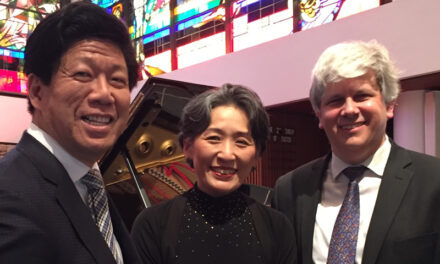From the hallway of the upstairs East Duke Building, we could hear musicians warming up, testing the acoustics, and setting up electronic equipment. The spring Duke University Graduate Composers program is always exciting. Young, already award-winning, and accomplished as composers, conductors, arrangers and teachers, they represent a fresh wave of music-makers, rolling in with great new stuff. Anticipating works by Bryan Christian, David Kirkland Garner, Paul Leary and Vladimir Smirnov, appreciative family, friends, students and “townies” filled the Nelson Music Room.
Pianist John Noel introduced the first piece, 8 American Folksongs (2009) for solo piano by David Kirkland Garner (b.1982). With well-informed keyboard technique, Garner’s set ranges from Ivesian camp-meetings to Joplin-esque and blues-like treatments. This is the kind of piece that will slide immediately into the piano repertoire — beautifully crafted, playable, and accessible. There is truly an American quality to the sound, but unlike Ives, Garner is not breaking down concrete walls — at least not yet.
Marées (2010) by Bryan Christian (b. 1984) provided a stunning contrast, not just in instrumentation, but entire approach to composition. Christian explains the title, “Marées meaning tides, is about the movement of water.” Exploiting the capabilities of the instruments through extended performance practice and beautifully sustained tones, Christian abandons conventional tonality capturing the sound and the timelessness of the sea. And like Robert Erickson’s 1969 Pacific Sirens, the suspension of time lifts us out of the everyday to a spiritual place. Marées was beautifully performed by Nathan Zalman, flute, Carrie Shull, oboe, John Noel, piano, Rob Rempher, violin, Katie Wyatt, viola, and Leah Gibson, cello.
The perfect segue was an electronically constructed piece, Dreams of a Tormented Luddite (2011), by Paul Leary. There were wonderful moments — brilliantly made synthesized sounds that transported me to his imaginary world. He created interesting layers of colliding textures. Yet, despite the whrrrring, clanging, grrrrrs, and bzzzzz of things that go bump in the night, I didn’t get the feeling that this Luddite was scared out of his wits; on the other hand, maybe (s)he was completely disgruntled by the planet’s utter dependence on technology — a Kurt Vonnegut perhaps. In that case, I get it!
Besides a very active compositional life, Leary, with experience as a lecturer in electronic music at Case Western Reserve, already has a teaching post at Denison University in Ohio. Dreams of a Tormented Luddite is in partial fulfillment of the requirements for a Ph.D. in Composition at Duke. The music community on campus will surely wish him well.
The final piece on the concert was a String Quartet (2011) by Vladimir Smirnov (b. 1986). It’s a challenging and sometimes painstaking genre for which to write, so composers consider the string quartet a major undertaking. Taking a year to complete, this one was no exception. This work also requires an equal measure of commitment by the players. In his notes, Smirnov says, “The players are frequently asked … to play at the extremes of their instruments’ possibilities of dynamics and range.” And from my seat, concentration and focus on the ensemble was equally critical.
Each of the five movements presents a unique exploration of sound. The first movement begins with a pulsating figure that pulled me in like a slowly churning undercurrent, and with canonic treatment of falling half-steps, he creates dreamlike “soundscapes” that seem to say, “I’ve been here before.” With an extensive understanding of stringed instruments, he explores texture and timbre that yield shimmering silver to lush, velvety colors, and rich sonorities. Nevertheless, there is a clear sense of forward motion. The second movement, for example, feels like a trip across the plains or perhaps frozen tundra in a four-wheel drive. Technically, everything was there and given enough rehearsal time, I think the performers could have found more. But this was a fine reading by Laura Thomas and Rob Rempher, violins; Katie Wyatt, viola; and Phil Warren, cello. I have a sense that this piece has something personal to say — the work of an artist.
Advisors looked happy, parents beamed, and composers must have sighed in relief. It was a thrill and a privilege to hear such fine compositions. And for the remainder of the evening, I felt the world was in good order.











